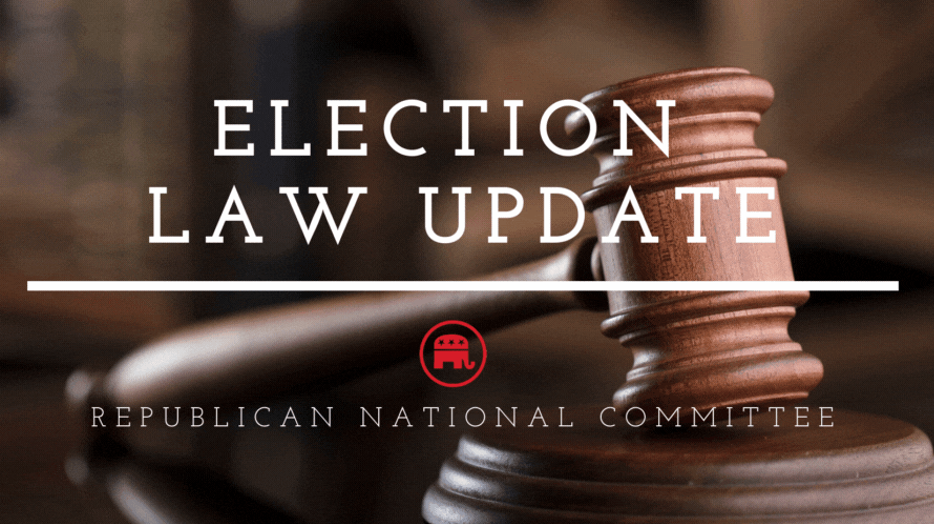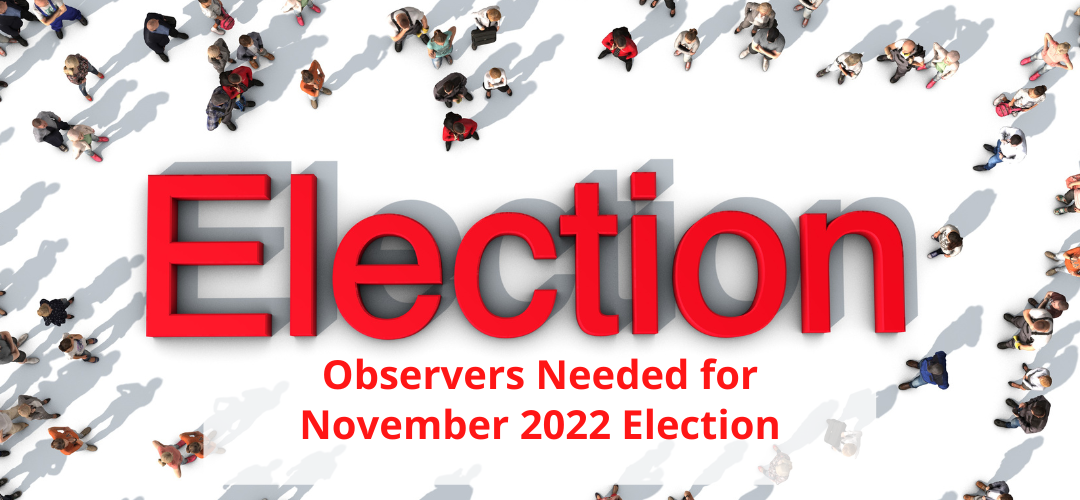During the last two elections, including the attempted Recall of Gavin Newsom, voters made it clear that they were concerned about Election Integrity and wondered if their vote would be counted. Dinesh D’Souza’s “2000 Mules” documentary added to the anxiety as he produced evidence that ballot harvesting was taking place in states where it was illegal.
Of course, ballot harvesting is legal in California – and now we do it too! It pains the Democrats to see how effective our programs have been statewide, and they continue to contemplate how to change the rules to bring back their advantage in using this tool. In the meantime, once ballots are mailed the first week in October, voters may bring their completed ballots in their pink signed envelopes to our headquarters. We will hand-deliver all ballots by the next business day to make sure your votes are counted.
As the November 2022 election approaches, we want to assure you that SacCountyGOP has a robust election observing program, and we share the concerns of voters that the process needs to be monitored. We also want you to know that we have confidence that the Sacramento County Elections Department is in good hands. We have a close working relationship with that office, and find them open to acting on our findings with solutions to make sure conservatives feel welcome as they cast their ballots. Our observers in the June Primary had fewer issues they witnessed at Vote Centers, and that was thanks in part to improved training of election workers.
In September, our Election Integrity Officer Nina Caron will begin training Election Observers to work the last eleven days as Vote Centers open. We also encourage those with experience observing on our behalf to let us know you’ll step up again to work the November election.
CLICK HERE to let us know you’d like to observe or work the November Election.

The Republican National Committee and many private foundations are litigating election integrity-related issues across the nation to make sure election officials count all legal votes in November. Below is an update on Election Law provided by the Republican National Committee.
Federal Legislation
Committee on House Administration Ranking Member Rodney Davis (R-IL) introduced the “American Confidence in Elections Act (ACE Act),” comprehensive legislation that focuses on strong election integrity reforms while respecting the Constitution, federalism, and conservative principles. The ACE Act protects political speech and addresses the challenges faced by military and overseas voters. Ranking Member Davis hosted a roundtable discussion with members of Congress, state election officials, and key stakeholders on Wednesday, July 27th, to discuss the clear path to passing the ACE Act in the House of Representatives next Congress. Watch the roundtable HERE.
State Legislation
Delaware
Governor Carney signed SB320, which expands voting by mail to all registered voters and eliminates the state’s previous requirement that voters have a qualifying excuse to vote by absentee ballot. The bill’s mail voting expansion efforts include allowing voters to complete an online or paper application to receive a mail ballot and all ballots can now be returned by mail, by dropbox, or at a county’s Department of Elections office. Voters have the ability to track the status of their mail ballot through an online portal. Additionally, SB320 requires the state election commissioner to appoint an equal number of Democrats and Republicans to open the mail ballots—checking them against the department’s list of voters and counting them by election district.
New Jersey
Governor Murphy signed several election related bills (below) into law last week:
· AB1969: allows minors to serve as election workers between 5:30 a.m. and 9:00 p.m. on election days.
· AB3817: requires ballot privacy sleeves at polling places; makes various changes to early and mail-in voting procedures; creates online form to update name and residence on existing voter registration record.
· AB3819: specifies circumstances when voters will be removed from permanent vote by mail status and when ballots will be sent to primary address; requires educational campaign; makes appropriation of $5 million.
· AB3820: prohibits unaffiliated mail-in voters from receiving mail-in ballot for primary election; requires election officials to provide such voters certain notices; prohibits mail-in ballot envelopes from containing visible political affiliation or designation for certain elections.
· AB3822: changes certain mail-in ballot deadlines; permits opening and canvassing of mail-in ballots prior to Election Day; permits pickup schedule for certain mail-in ballots; requires confirmation notice when voter changes party affiliation at Motor Vehicle Commission.
· AB3823: requires enhanced review of death records two months prior to the election; permits remote training for certain election workers; exempts election worker compensation from taxation and remuneration.
· AB3929: allows certain voters residing overseas to vote in certain elections in the State, depending on overseas residency or intent to return.
State Litigation Highlights
Arizona
On July 22, Arizona Free Enterprise Club sued Arizona Secretary of State Katie Hobbs and the political committee Arizonans for Free and Fair Elections alleging that many of the signatures turned in to support a new initiative, the Arizona Fair Elections Act, were invalid for various reasons and should not have counted.
In August, a lawsuit, Mi Familia Vota v. Hobbs, was filed in AZ challenging S.B. 1485, which removes voters from the permanent mail ballot list if a voter does not vote by mail in two straight election cycles; and S.B. 1003, which requires voters to “cure” signature-less ballots by 7PM on Election Day. The RNC and the NRSC intervened to defend the laws. On March 14, Mi Familia Vota filed a notice with the court stating that it did not intend to seek a preliminary injunction prior to the 2022 midterms. On June 24, the court granted in part and denied in part defendants’ motion to dismiss. The court (1) allowed the plaintiffs to pursue their claim that S.B. 1485 (which provides for maintenance of the Permanent Early Voting List) was enacted with a discriminatory intent, and (2) dismissed the remaining claims but granted the plaintiffs’ leave to file an amended complaint. On July 18, the plaintiffs filed an amended complaint.
Two lawsuits were filed challenging HB2492, which requires proof of citizenship for individuals who register using a federal form required by the National Voter Registration Act (NVRA). Any voter who cannot satisfy the requirement will be ineligible to vote for president or by mail. On May 12, the RNC, the Republican Party of Arizona, and Mohave and Gila County Republican Parties moved to intervene in the two lawsuits to defend HB249. The intervention motion was denied on June 23 and the party committees are weighing next steps. The Democratic National Committee (DNC) and the Arizona Democratic Party also plan to file a lawsuit challenging the law. On July 5, the Department of Justice (DOJ) also filed a lawsuit against Arizona challenging the proof of citizenship requirement.
Florida
In June, the RNC and NRSC were granted intervention in all four lawsuits challenging provisions of SB90, Florida’s 2021 election reform legislation. On March 31, the U.S. District Court permanently enjoined multiple provisions of SB90 including the required registration disclaimers for third party voter registration organizations (§ 97.0575(3)(a)), registration delivery provisions for third party voter registration organizations (id.), drop box regulations (§§ 101.69(2)-(3)), and line warming provisions (§§ 102.031(4)(a)-(b)). Defendants, including the RNC and NRSC filed a notice of appeal on April 7, and a stay request with the 11th Circuit on April 11. On May 6, the 11th Circuit granted the defendants’ stay request , leaving in effect provisions previously struck down by the lower court and rejecting the district court’s order to put Florida under “preclearance” for ten years. On June 9, the 11th Circuit granted the plaintiff’s motion to expedite the appeal and tentatively assigned oral arguments on September 15, 2022 in Miami. Defendants filed their appellate briefs with the 11th Circuit on June 11. A number of groups and interested parties have submitted amicus briefs in the 11th Circuit on behalf of Florida including Restoring Integrity and Trust in Elections (RITE), Georgia Attorney General Christopher Carr, the Honest Elections Project, the Foundation for Government Accountability, the American Constitutional Rights Union, Lawyers Democracy Fund, and the Public Interest Legal Foundation.
Georgia
In July of 2021, the RNC, NRSC, NRCC, and GA GOP were granted intervention in eight lawsuits, including the DOJ’s lawsuit against the State, challenging provisions of SB202 . Previously, the court denied motions to dismiss for lack of standing and on the merits, filed by the RNC, other Republican organizations, and Republican lawmakers in Georgia in eight of the lawsuits. In December, the court denied the motions to dismiss filed by the State, RNC, NRSC, NRCC, and the GA GOP. In the Vote America suit, the court considered the plaintiffs’ request for a preliminary injunction at a hearing on June 9 and 10. On June 30, the court denied plaintiffs’ motion for preliminary injunction. On July 18, a preliminary injunction hearing was held in the New Georgia Project consolidated case.
On May 2, a group of liberal organizations sued Georgia’s Election Board challenging a state law that requires handwritten signatures on absentee ballot applications. The groups seek declaratory and injunctive relief, requesting the court find that the so-called Pen and Ink rule violates the Civil Rights Act and to enjoin its enforcement. The RNC and GAGOP moved to intervene in the litigation on June 24. On July 13, the Georgia Election Board moved to dismiss the claims against them.
Trial in the federal lawsuit filed back in 2018 by liberal voting rights groups was completed on June 23. The plaintiffs argue the state’s “exact match” registration rules violate the Constitution and the Voting Rights Act.
Iowa
The RNC, Iowa GOP, NRCC, and NRSC were granted intervention to defend against a lawsuit challenging provisions of SF413 and SF568 . The trial set for March 21 was pushed back in light of discovery disputes between the Iowa legislature and plaintiffs. On March 16, the Iowa Supreme Court granted certiorari to resolve these discovery disputes.
Massachusetts
The MAGOP chairman filed a lawsuit in the Supreme Judicial Court on June 23 challenging the state’s new permanent mail-in voting law. The lawsuit argues permanent mail-in voting violates the Massachusetts constitution. The action includes a motion for temporary restraining order to prevent implementation of the law before the 2022 election. On June 28, the state filed a combined motion to dismiss MAGOP’s complaint and opposition to MAGOP’s motion for temporary restraining order. The MA Supreme Court denied MAGOP’s motion to enjoin the law. MAGOP plans to appeal this decision to the United States Supreme Court.
Michigan
In 2019, activist groups challenged Michigan elections laws that restrict paid voter transportation services and out-of-state organizations assisting voters with absentee ballot applications. The RNC and MIGOP were granted intervention in the case. The district court initially granted an injunction that prohibited Michigan from enforcing its voter transportation restriction, but the 6th Circuit reversed. On March 21, the RNC and other Republican groups filed a motion for summary judgment and asked the district court to dismiss the suit. On March 29, Uber filed an amicus brief on behalf of the activist groups.
Missouri
A lawsuit filed on June 22 by several civil rights activists against the state of Missouri argues the State’s limitations on voter assistance violate the Voting Rights Act. A Missouri law from 1977 states no one can assist more than one voter per election unless they are immediate family members or an election judge.
Montana
In April 2021, the Montana Democratic Party and activist groups sued the state over its election integrity measures, which include elimination of Election Day voter registration, types of voter ID permitted, and paid ballot harvesting. On April 6, 2022, a Montana state court temporarily suspended enforcement of these laws. The case has been appealed to the MT Supreme Court. On May 17, the MT Supreme Court granted the defendant’s stay of the preliminary injunction. On June 9, Restoring Integrity and Trust in Elections (RITE) filed an amicus brief on behalf of state. On July 12, the MT Supreme Court announced it would hear the case en banc and decide the case on the written briefings.
A state district court struck down a law that prohibited election officials from distributing ballots to minors who would turn 18 during the month before the election. The other three challenged laws will continue to trial.
New Hampshire
Immediately after Governor Sununu signed Senate Bill 418 into law, progressive groups filed a lawsuit challenging the new affidavit ballot law. The lawsuit seeks to have the court declare SB418 violates the New Hampshire Constitution and issue a permanent injunction to block its enforcement. On June 21, the ACLU also sued New Hampshire.
New Jersey
On July 29, the RNC sued the Mercer County Board of Elections after the Board refused to provide the RNC with publicly available documents related to the county’s administration of elections as required by law.
New York
The RNC, NRCC, and New York State Republican Committee filed a motion to intervene in a case brought by Democrats challenging NY ballot rejection practices. On May 13, the court granted the RNC’s motion to intervene. On June 27, the court heard oral arguments on the Democrats’ motion for a preliminary injunction. On July 13, the court denied the Democrats’ motion for a preliminary injunction except that the Democrats can instruct local election boards that the existing notice and cure procedures shall be applied to absentee ballots missing postmarks that are received between two and seven days after Election Day for the upcoming 2022 elections.
In January, the RNC and NYGOP, leading a broad bipartisan coalition of officeholders and concerned citizens, including Congresswoman Malliotakis and naturalized citizen voters, sued Mayor Eric Adams, the New York City Council, and the New York City Board of Elections in state court over the “Non-Citizen Voting Law,” which illegally allows non-citizens to vote in city elections. The complaint is available here. The NYC Board of Elections has since requested that the State review the law and issue an opinion on its legality. The case was assigned to Judge Ralph Porzio. On June 27, the judge struck down the Non-Citizen Voting Law, explaining in his opinion that it violates the New York State Constitution, New York State election law, and the Municipal Home Rule Law. On July 22, New York City filed a notice of appeal. On July 25, the intervenor defendants filed a notice of appeal.
North Carolina
The Supreme Court granted writ of certiorari in Moore v. Harper on June 30. The lawsuit challenges the congressional maps drawn by North Carolina lawmakers. The petition for review came after the North Carolina Supreme Court blocked the state from using the challenged maps in the primary election and required redrawn districts. Arguments in the case are expected in the fall.
Disability Rights North Carolina sued the State Board of Elections last September over state laws that prohibited certain people from assisting absentee voters who are disabled and live in hospitals or nursing homes. On July 11, the court ruled that voters with disabilities can receive assistance from anyone they choose other than the voter’s employer or union agent.
Pennsylvania
In January, five voters who failed to date their ballot sued the Lehigh County Board of Elections in federal court to have their undated votes counted. Both Ritter and the losing candidate in the election intervened. After the district court declined to delay certification, the 3rd Circuit issued a temporary injunction preventing the county Board from certifying. On May 20, the 3rd Circuit ruled that the date requirement was immaterial and ordered that the undated ballots be counted. SCOTUS granted an administrative stay after Ritter’s stay request in the 3rd Circuit was denied. The stay was vacated by the SCOTUS in a 6-3 decision with Justices Alito, Thomas, and Gorsuch dissenting. The U.S. District Court accordingly ordered Lehigh County Board of elections to count the undated ballots in accordance with the 3rd Circuit’s decision. Ritter conceded the contested election for Lehigh County Court of Common Pleas judgeship on June 21. Ritter filed a cert petition with SCOTUS asking the court vacate the 3rd Circuit’s decision.
There is new litigation stemming from the undated ballots issue in the recent primary election where the Secretary of the Commonwealth sued Berks, Fayette, and Lancaster counties asking the Commonwealth Court to require the counties to include the undated ballots in the certified results reported to the state. A hearing was held for the case on Friday, July 29.
In a second suit stemming from the undated ballot issue, 14 Republican members of the PA House of Representatives sued on July 20 asking the court to invalidate all remaining provisions of Act 77 that are still in effect.
On March 8, the PA Supreme Court heard oral argument on the challenge to Act 77, which established no excuse absentee voting in PA. This was an appeal of a January 28 Commonwealth Court ruling that struck down Act 77, holding it violated the PA Constitution. Under PA law, the Commonwealth Court ruling was automatically stayed but the court subsequently terminated the stay effective March 15. The termination of the stay was appealed to the PA Supreme Court, which reinstated the stay, effective until the conclusion of the case. A link to the oral arguments can be found here.
On February 11, the RNC sued PA’s Bucks County Board of Elections for its refusal to provide records related to how it counts absentee ballots. On June 24, the RNC filed a motion for a continuance. The hearing for the motion for continuance is set for August 4.
Texas
A federal district court dismissed a case filed by the Texas Democratic Party that claimed the state’s limitation of absentee voting to persons 65 years and older violated the equal protection clause of the Fourteenth Amendment.
The DOJ sued the State of Texas and the Texas Secretary of State, challenging certain provisions of SB1, Texas’ 2021 voting integrity legislation. The DOJ claims SB1 violates Section 208 of the Voting Rights Act and Section 101 of the Civil Rights Act. The RNC, NRCC, NRSC, and Dallas and Harris County Republican Parties moved to intervene in the DOJ suit and others challenging SB1. The court denied the party committees’ motion to intervene but the 5th Circuit reversed and ruled that the Republican committees were entitled to intervention as of right. The RNC and other party committees re-filed for intervention, which was granted by the district court on May 13. On May 24, the court denied the plaintiff’s motion to dismiss. On May 31, the court granted the parties’ unopposed motion to stay pending appeal. On June 8, the court set a bench trial for July 17, 2023. On June 14, the court ordered a modified permanent injunction. On July 12, the court granted in part and denied in part defendant’s motion to dismiss, allowing only the claims brought by LULAC Texas, Voto Latino, the Texas Alliance for Retired Americans, and Texas AFT against the Texas Secretary of State and the Texas Attorney General to proceed.
The 5th Circuit, in two similar cases challenging various provisions of the Texas election code, directed the lower court to dismiss the Secretary of State from the case because he was not a proper defendant.
On June 16, a federal court granted plaintiff’s motion for summary judgement and issued a permanent injunction to block Texas House Bill 3107’s wet signature requirement. The judge held the wet signature requirement violated the First and Fourteenth Amendments because it creates an undue burden on the right to vote. On June 17, the intervenor defendants filed an appeal; and on June 21, the court denied their motion to stay. On June 29, the court granted appellant’s motion for a temporary administrative stay pending consideration of the motion for stay pending appeal.
Vermont
In September, the RNC sued the cities of Montpelier and Winooski over their new town charters that allow non-citizens to vote in their municipal elections. The lawsuit also raises important concerns about how the laws will be implemented and whether non-citizens will end up on the same voter registration lists used for state-level and federal elections. The RNC is joined in the suit by the Vermont Republican Party and several concerned Vermont voters. A hearing on the motion to dismiss in the Montpelier litigation was held on March 31. On April 1, the Montpelier court granted the defendants’ motion to dismiss, finding the plaintiffs have standing, but under its interpretation of Vermont Supreme Court precedent, was required to dismiss the case. The RNC and other plaintiffs filed a notice of appeal on April 29. The hearing on the motion to dismiss in the Winooski case took place on June 27.
Wisconsin
On July 12, 2022, the Waukesha County Republican Party and three individuals sued the Wisconsin Elections Commission for unlawful guidance it issued regarding curing witness information required on absentee ballot declarations.
In Teigen v. WEC, the WI Circuit Court ruled that absentee ballot drop boxes are not permitted under Wisconsin law and ordered the Wisconsin Elections Commission (WEC) to retract its instructions on the use of drop boxes. WEC appealed the ruling. The court also denied a request to stay the ruling for the February 15 primary while the defendants pursue an appeal. The Court of Appeals granted petition to bypass; thus, the WI Supreme Court will hear argument on the case. The WI Supreme Court denied a stay motion that would have allowed absentee drop boxes through the April 5 election; accordingly, drop boxes located outside of local clerks’ offices will be illegal and no one other than the voter will be allowed to return an absentee ballot. On March 23, the RNC, NRSC, and Republican Party of Wisconsin moved to file an amicus brief in support of Teigen. The WI Supreme Court heard merits arguments on the case on April 13. Update: On July 8, the WI Supreme Court affirmed the lower court’s decision and found that absentee drop boxes located outside of local clerks’ offices are illegal.
On July 22, four Wisconsin voters with disabilities sued the Wisconsin Elections Commission (WEC). This suit is in response to WEC Administrator Meagan Wolfe’s public statements that ballot-return assistance is no longer permissible for any method of absentee voting. The plaintiffs filed a motion for a preliminary injunction and emergency declaratory relief on July 27.
Other News
Federal: Last week, the Committee on House Administration held a hearing titled “The Independent State Legislature Theory and its Potential to Disrupt Our Democracy.” Watch the full hearing HERE. Read or watch the Committee’s Ranking Member Rodney Davis’s remarks on the hearing HERE.
Federal: On Wednesday, the Senate Rules Committee will hold a hearing on titled “The Electoral Count Act: The Need for Reform.” Watch the hearing HERE.
National: Continuing its multi-million-dollar investment, the RNC has hit multiple election integrity milestones with 100 days left before the midterm election including: 17 state election integrity directors, 29 in-state election integrity counsels, over 32,000 poll watchers in primary, general, and special elections, over 65,000 unique volunteer engagements, and has successfully held over 2,700 Election Integrity trainings.
National: The Foundation for Government Accountability filed a lawsuit to compel the U.S. Department of Justice to respond to initial FOIA requests regarding the plan to implement Executive Order 14019 , which directs all federal agencies to do what they can to increase voter registration and turnout. A federal District Court recently ordered the DOJ to provide all requested documents required under the FOIA request before the midterm elections.
National: The United States Postal Service is creating a division to handle election mail issues as part of an effort to ensure swift and secure delivery of ballots for the 2022 midterm election.
AL: Secretary of State Merrill endorsed the American Confidence in Elections Act, introduced by Representative Davis (R-IL).
AZ: Pima County Elections Department has corrected wrong information given during a training to temporary election workers, after RNC Arizona Election Integrity Counsel Eric Spencer contacted the Department.
CA: Court strikes down San Francisco’s non-citizen voting law.
FL: In 2020, a representative of the Alachua County Supervisor of Elections conducted a series of outreach efforts at the local county jail to let inmates know of their new rights and offer to help them add their names to the voter rolls. Now, 10 men who the representative helped register to vote have been charged with voter fraud on the grounds they were ineligible.
GA: The RNC Georgia Election Integrity Director Jonathan Moseley was featured in The Atlanta Journal-Constitution for his efforts to train thousands of volunteers on the do’s and don’ts of poll watching.
GA: A Georgia judge on Monday upheld Republican Rep. Marjorie Taylor Greene’s eligibility to run for re-election. The challenge was based on Section 3 of the 14th Amendment, which prohibits any officeholder who engaged in an insurrection against the U.S. to return to their elected positions.
MI: The RNC sent a letter to the Michigan Secretary of State seeking clarification regarding the absent voter signature verification process and the ability to observe such process.
MI: Secure MI Vote, a ballot measure looking to amend certain election regulations in Michigan, turned in more than 514,000 signatures Friday. State election officials are not required to review and certify the signatures until July 2024 since the deadline to submit signatures was June 1, 2022.
NC: Starting July 27, 2022, an individual serving a felony sentence, who is not in jail or prison, may register to vote and vote. An individual must also have resided in North Carolina for at least 30 days prior to the election, be a U.S. citizen, and be at least 18 years old by the next general election.
NM: Over the objections of state election officials, a U.S. District Court Judge will allow VoteRef.com to publish New Mexico voter registration records online.
OH: Ohio’s Poll Worker Tracker shows Ohio gained more than 2,600 poll workers last week, and as of last Monday, July 25th, 27,371 Ohioans have signed up to serve as poll workers in the Aug. 2 primary/special election.
TX: Secretary of State Scott has randomly selected four counties (Harris, Guadalupe, Eastland, and Cameron) for election audits, which will begin immediately after the November 2022 election.
TX: Harris County District Attorney Kim Ogg announced the grand jury indictments of three local Democrats (Richard Bonton, Natasha Demming, and Damien Jones) connected to two election fraud schemes tied to the local Texas House of Representatives races in House Districts 142 and 132.
WI: The RNC sent a letter to the City of Milwaukee Elections Commission demanding that the Commission cease and desist from engaging in election activities at the Appointment Sites.
WI: The Racine County Sheriff’s Office addressed concerns involving allegations of voting fraud within the website, My Vote Wisconsin. With only a person’s name and date of birth, anyone can request another person’s ballot, then they can then have that ballot sent to any address that’s entered.
WI: The Wisconsin Elections Commission plans to launch a voter education campaign this fall in hopes of building more trust in the state’s elections. The campaign will explain the process and dynamics of registering to vote, absentee voting, polling centers, and how to become a poll worker.
Op-ed: Representative Davis (R-IL) discussed the “American Confidence in Elections Act (ACE Act)” in a recent op-ed in The Hill.
Op-ed: Lawyers Democracy Fund’s Tom Spencer has an op-ed in the Daily Caller about states’ recent voting integrity reforms.
Op-Ed: Jason Snead, Executive Director of the Honest Elections Project, discusses Moore v. Harper which will be heard by the U.S. Supreme Court next term.





